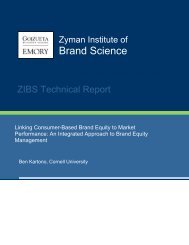The Executive's Guide to Branding - Emory Marketing Institute
The Executive's Guide to Branding - Emory Marketing Institute
The Executive's Guide to Branding - Emory Marketing Institute
Create successful ePaper yourself
Turn your PDF publications into a flip-book with our unique Google optimized e-Paper software.
the brand becomes in the purchase criterion. For “search” goods, one can<br />
evaluate the qualities of the product before the purchase. Many consumer<br />
packaged goods fall in<strong>to</strong> this category. <strong>The</strong> risk associated with the purchase<br />
is quite low since the quality can be examined before the purchase, or tried<br />
at a low cost. As the goods become more intangible it becomes harder <strong>to</strong><br />
discern the quality of the offer and that makes the brand more prominent.<br />
For experiential or credence goods, product quality is often difficult <strong>to</strong> discern<br />
even after consumption, and you might need extensive experience before<br />
arriving at such an assessment. After all, you do not drive a car for a week<br />
and become convinced of its overall reliability!<br />
In such cases, the consumer’s brand perceptions of intangibles such as<br />
implied reliability, quality and image of product innovation and expertise play<br />
a critical role in determining cus<strong>to</strong>mer loyalty. Experience with a brand<br />
lowers perceived risk and enhances loyalty. Lack of experience with a<br />
product leads <strong>to</strong> higher risk perceptions reducing the likelihood of that option<br />
being tried by consumers. Thus, in “experience” goods consumer often rely<br />
on the sellers’ expertise. In this case the sellers brand associations lead the<br />
consumer’s choice.<br />
Interestingly, while brand management practices are common in the<br />
consumer packaged goods industries, they can be expected <strong>to</strong> be even more<br />
valuable in product markets where experience and reliance on brand<br />
associations are even more critical in reducing risk and influencing choice.<br />
Thus firms offering high-risk “experiential” goods and firms in services<br />
industries should find branding very attractive. Service offerings (like finance,<br />
Zyman <strong>Institute</strong> of Brand Science – Perspectives 7





